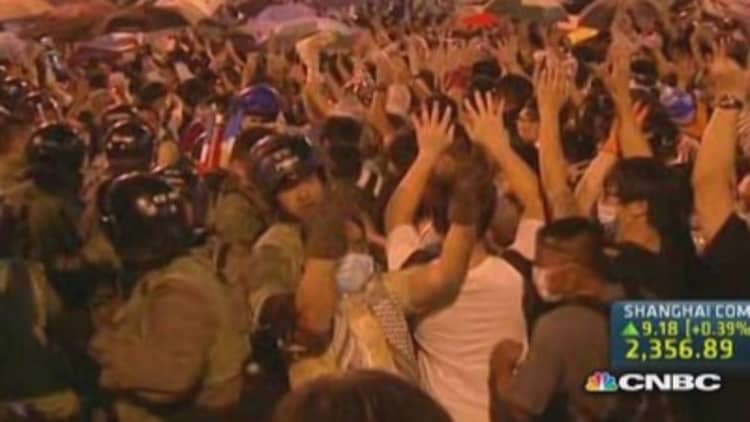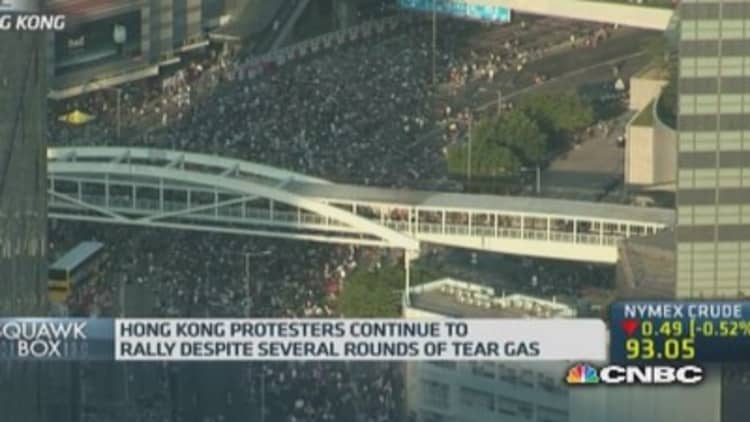
Hong Kong's worst protests since China took back control of the former British colony in 1997 haven't just decked the territory's stocks and currency, with analysts expecting longer-term economic repercussions.
"Hong Kong is a very small city. It is very dependent on the financial system and the financial markets for its income," Sean Darby, global head of equities at Jefferies, told CNBC. "The worry would be these types of protests and activities, in terms of disruption, start to have a long-term drain on the economy and on people putting in investment into the economy."
Riot police fired tear gas and launched a baton charge against Hong Kong democracy protestors early Monday, with protesters erecting barricades and scuffles breaking out between demonstrators and security forces. The protests spurred 17 banks to close as many as 29 branches, offices or ATMs temporarily, while many businesses in the central area remained shuttered.
Read More Live Blog: Hong Kong protests take dramatic turn
fell as much as 2.5 percent in intraday trade, touching its lowest levels since July. The normally staid Hong Kong dollar lost ground, with the greenback fetching as much as $7.7647, spurring the territory's monetary authorities to reassure the markets that it stands ready to intervene to keep the currency within its proscribed trading band.
Analysts are concerned that the protests come just as Hong Kong is already facing increased competition for investment from mainland China. Financial services account for around 16 percent of the territory's gross domestic product (GDP), according to a recent note from HKTDC. A new trading link between the Hong Kong and Shanghai stock exchanges is due to launch in October, allowing investors outside China to access mainland-listed A-shares.
Read More Hong Kong resorts to tear gas to break up protesters
"Irrespective of the protests, longer term it pushes an awful lot of liquidity into China's market and financial system," Darby said. "The end game is that to some extent, parts of the Hong Kong markets, like the equity markets, where the H-shares are listed, will become a little bit of a backwater," with the protests set to exacerbate the flow of liquidity choosing the mainland over the territory.
Others also cited concerns on whether Hong Kong can keep investors interested as China starts to crack open the doors to its markets.
"Hong Kong clearly has its work cut out in terms of holding on to its niche as being the clearing house or entry way to mainland China," as Shanghai becomes more accessible, Taimur Baig, chief economist for Asia at Deutsche Bank, told CNBC.
In addition, Hong Kong faces competitive pressure from other regions, Baig said.
Read More Images of Hong Kong's violent weekend
"Singapore, in particular, on the wealth management side has become more of a leader in Asia and Hong Kong has lagged in that area," Baig said.

Analysts are also watching for a hit to sectors depending on tourists from the mainland, such as luxury goods. Typically, masses of tourists would stream into Hong Kong during China's Golden Week holiday, which this year comes the first week in October. Tourism accounts for nearly five percent of Hong Kong's GDP, according to HKTDC data.
Read More Shanghai-HK stock connect: What you should know
"Hong Kong's retail sales will suffer if the protest continues to drag on," analysts at ANZ said in a note Monday. "While it is premature for us to forecast the impact as the National holidays have not started, the golden week sales will likely contract this year."
To be sure, some don't expect the protests will have much of a long-term impact.
"I'm afraid political instability has the habit of being like Teflon, nothing really sticks to [markets]," Andrew Freris, CEO of Ecognosis Advisory, told CNBC, citing the quick recoveries in Thailand and Indonesia after political turmoil there. "China has really no interest at all in driving Hong Kong into the ground."
—By CNBC.Com's Leslie Shaffer; Follow her on Twitter @LeslieShaffer1

